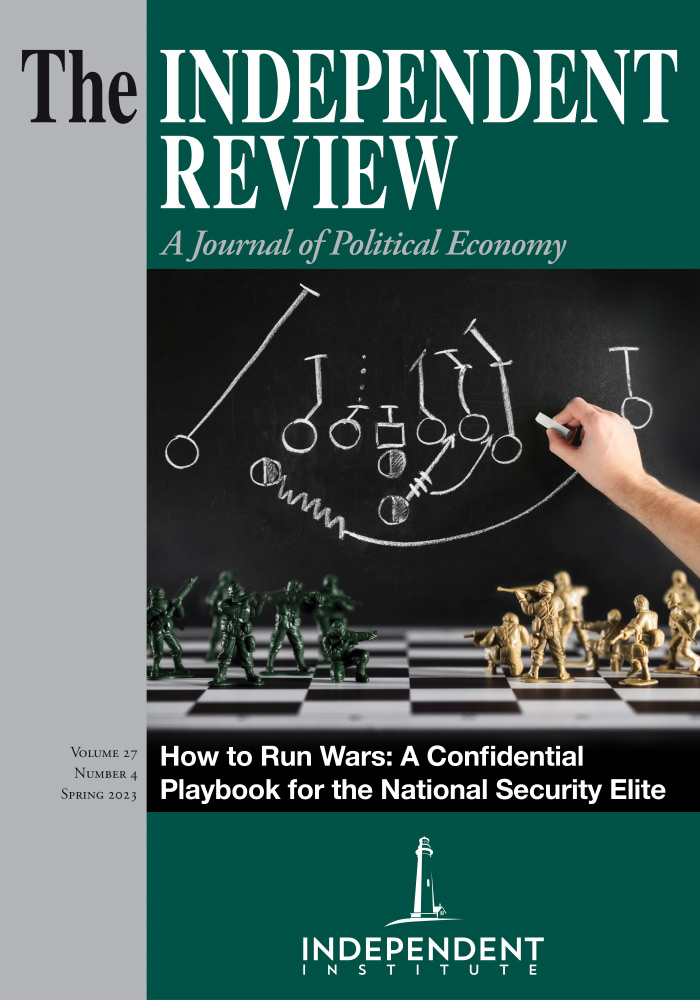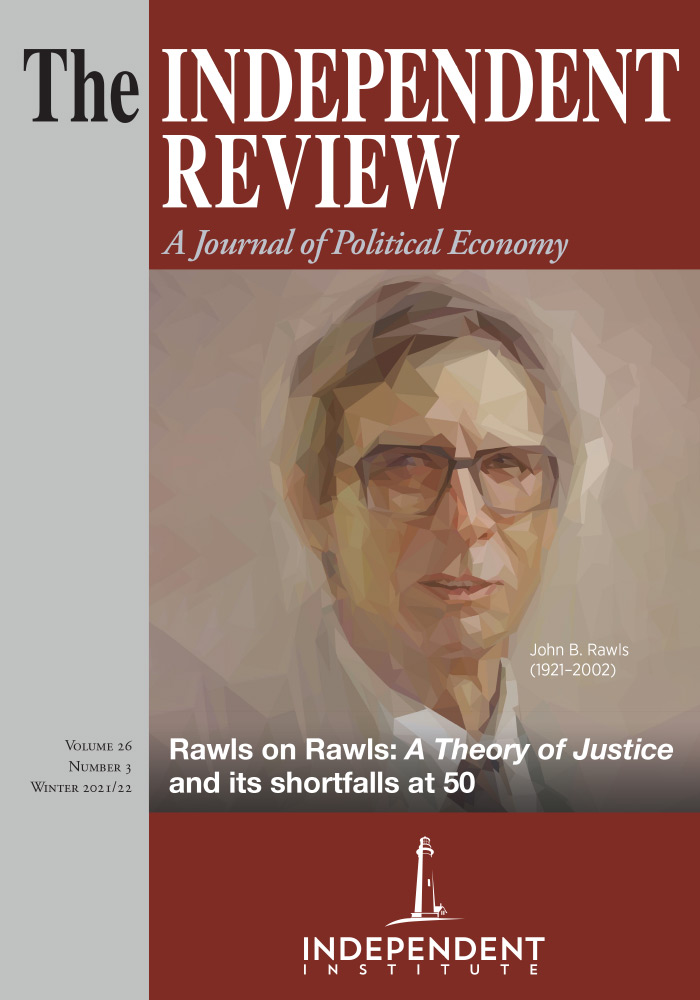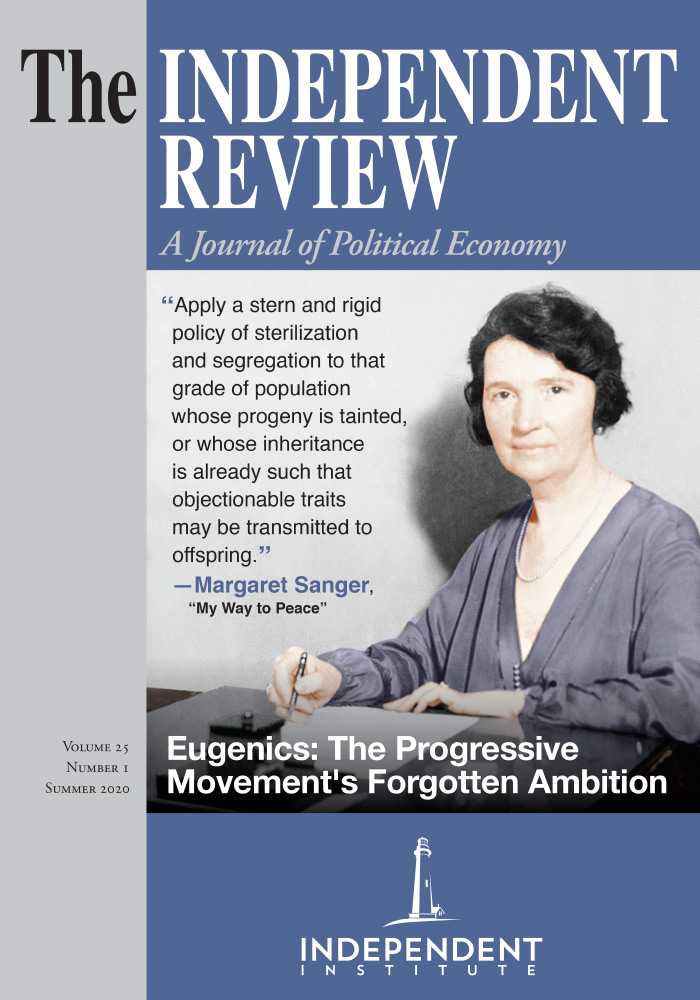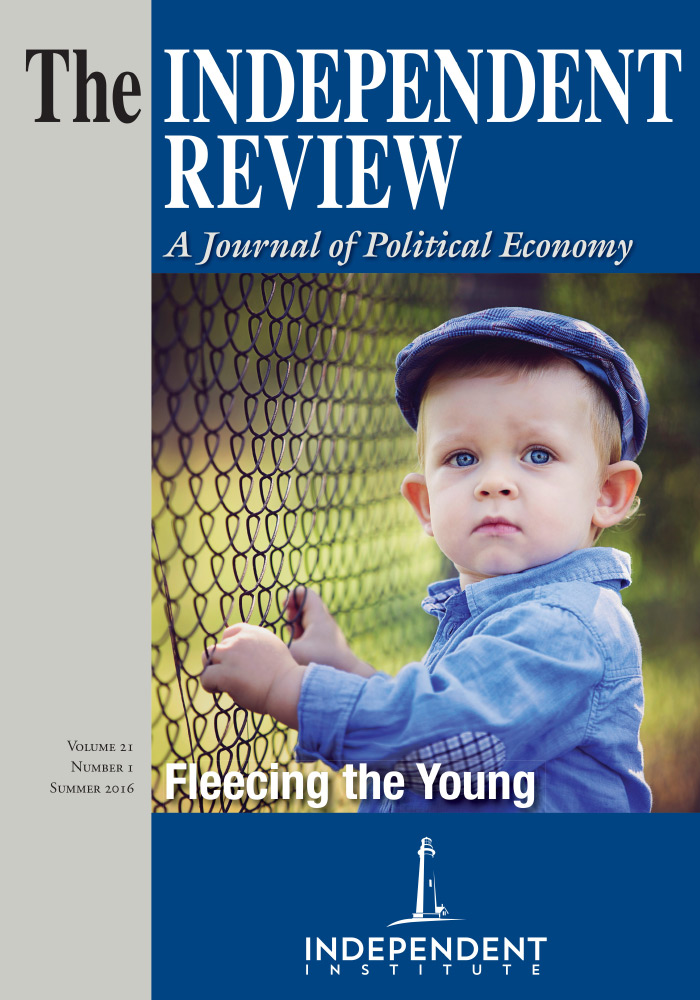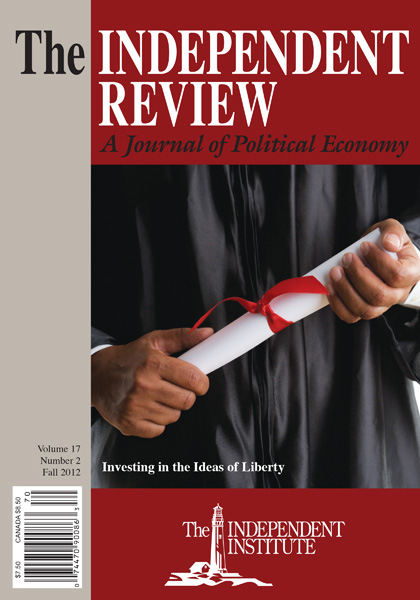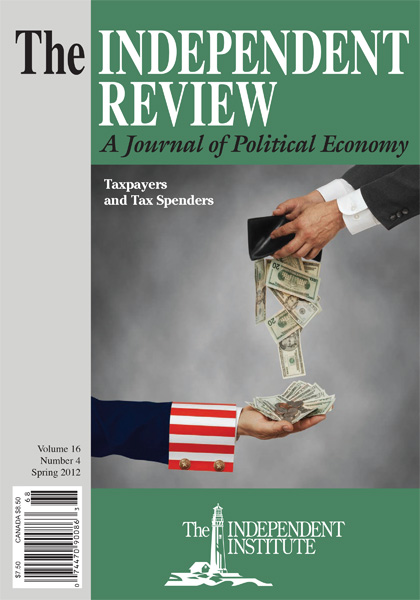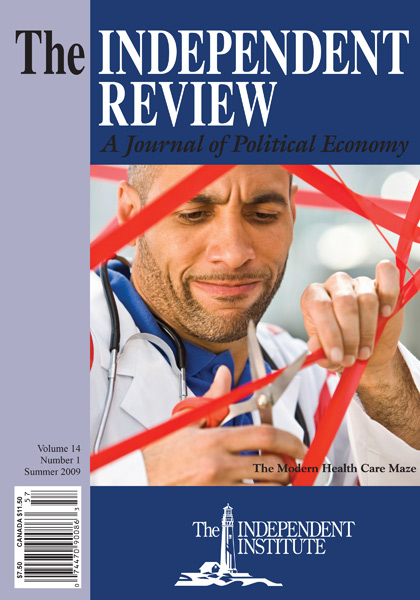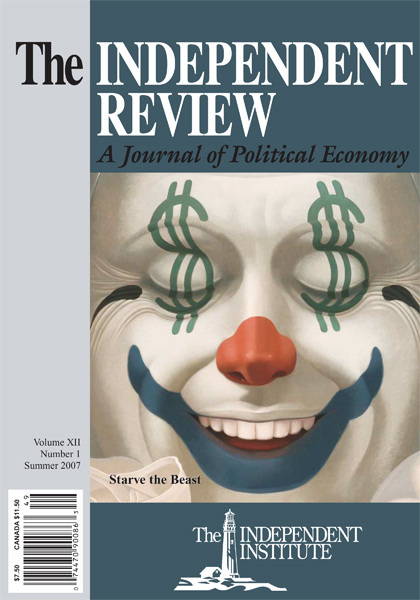If you are in the national-security elite and want to run a war—and especially if you are a wary citizen—this playbook is required reading. It explains that those running wars must try to capture the media, “crack a few eggs” (including civilians in foreign theaters), open the fiscal floodgates, prepare citizens to sacrifice liberties, skirt international law, elevate fear levels when faced with failure, and embrace top-down economic planning. Crisis breeds Leviathan. Don't let this guide fall into the wrong hands!
Article
To the National-Security Elites,
We stand at a critical juncture in the history of our country. Though the United States has always faced threats, the problems of today are unprecedented. As our commander in chief, President Biden (2022), recently said, “equality and democracy are under assault.” The threats come from many places. The National Defense Strategy (NDS) for 2022 highlights two powerful adversaries—China and Russia. China, “our [the United States’] most consequential strategic competitor,” has been working for decades to undermine U.S. policy goals (U.S. DOD 2022). The same may be said for Russia. “Russia poses acute threats,” reads the report, “as illustrated by its brutal and unprovoked invasion of Ukraine” (U.S. DOD 2022). As one commentator succinctly stated, “Both Russia and China ... view the U.S. as their mortal enemy.... [B]oth have developed doctrines that seek to defeat the United States. Both adversaries have redefined the traditional battlefield of ground, air, and sea to include space and cyberspace, and have developed arsenals ... to conduct ... warfare against the U.S. military, intelligence, and civilian networks and systems” (Koffler 2022).
Though China and Russia are the largest threats, they are not the only ones. The North Korean dictator, Kim Jong Un, “will continue efforts to steadily expand and enhance Pyongyang’s nuclear and conventional capabilities targeting the United States and its allies” (Office of the Director of National Intelligence 2022, 15). He remains “committed to expanding the country’s nuclear weapons arsenal” (17). Iran poses a danger that could destabilize the entirety of the Middle East. The most recent threat assessment from the Office of the Director of National Intelligence stated clearly that “Iran and its militant allies will take advantage of weak governance to continue to plot terrorist attacks against U.S. persons and interests” (2022, 5).
In addition to these external threats, the United States now faces real internal dangers as well. In response to the threat of domestic extremism and domestic terrorism, the Justice Department established a specialized unit to combat homegrown terrorism. As noted by Assistant Attorney General Matthew Olsen (2022), “We have seen a growing threat [within the United States] from those who are motivated by racial animus, as well as those who ascribe to extremist anti-government and antiauthority ideologies.”
The U.S. government has worked tirelessly as a force for good in the world. Things have not always gone according to plan—Iraq and Afghanistan being recent examples. These less-than-ideal outcomes have led many to be skeptical of the American government’s military capabilities and called into question the country’s geopolitical dominance. But the obstacles faced by the brave men and women in our military and our political leaders are not permanent roadblocks but mere speedbumps on the long road to our country’s perpetual project of spreading liberty, democracy, and peace around the globe. Naïve “peacemongers,” isolationists, and antigovernment ideologues have tried, and will continue to try, to persuade you to withdraw your support from the activities of your government. But to be deterred from this project means the triumph of authoritarianism over democracy, the victory of terrorism over peace, and the ascendancy of our enemies over our friends and allies.
If the United States fails in its goals of protecting and spreading democracy, illiberal regimes like Russia, China, Iran, and North Korea will not hesitate to utilize their military and political capabilities to spread their antidemocratic ideals. In doing so they will threaten freedom both at home and abroad. The United States government, as the world’s dominant military power, has a duty to protect our allies, those countries who cannot protect themselves, and our own people from those who would seek to destroy those values we hold most dear.
People—both at home and abroad—must be made safe and kept free. A proactive, military-driven foreign policy, carefully designed, implemented, and evaluated by those experts in the U.S. government is the only way to achieve this goal. But how?
We submit an answer and offer you a playbook for carrying out war. We discuss what is necessary to execute successful campaigns abroad. Though this guide utilizes examples from throughout history to illustrate our points, it will prove useful to contemporary and future conflicts as well. This playbook is intended for your eyes only and is not for consumption by the general populace. Indeed, a key part of building and maintaining a benevolent global hegemony is to keep the populace in check. Cultivating the correct popular image is paramount. Like the Wizard of Oz, the best-run wars are those that follow the motto “Pay no attention to that man behind the curtain!”
The Playbook
Curate the Narrative to Generate Popular Support
Successful wars require support from the domestic populace. Given what is at stake, the citizenry must support a conflict if the government hopes to be successful. Ideally, the citizenry will accept and dutifully complete the requests and dictates of national security leaders. Unfortunately, this is not always the case. Inevitably, there will be some loud detractors decrying the use of any military force whatsoever. As such, the government must prepare accordingly.
The successful achievement of U.S. government goals abroad requires careful messaging at home. Though it will be important to rhetorically emphasize transparency and accountability, there are simply things the American public ought not to know about national security matters. The use of “noble deception” will likely be required because certain choices that we, the elite, know to be good for the common people may be prohibitively unpopular or unfeasible without careful control of popular discourse. Though this may seem counter to liberal ideas, creative narratives and the careful control of information can be used to promote and protect U.S. foreign policy objectives when the citizenry may reject or fail to understand the correct policies. As journalist Irving Kristol correctly noted, “[T]here are different kinds of truth for different people. There are truths appropriate for children; truths appropriate for students; truths that are appropriate for educated adults; and truths appropriate for highly educated adults, and the notion that there should be one set of truths available to everyone is a modern democratic fallacy” (qtd. in Bailey 1997). In matters of national security, the American people are more like children than highly educated adults, and they must be treated as such. Fortunately, this realization is not new.
The U.S. government has a long history of careful message crafting related to foreign affairs and war. From the creation of the Committee on Public Information (CPI) during World War I, to the Office of War Information (OWI) and Writers’ War Board (WWB) during World War II, and more clandestine efforts during the Cold War, such as Operation Mockingbird, the government has long understood the importance of careful information dissemination (see Coyne and Hall 2018, 4–5). Given that the U.S. government spent over $4.3 billion on public relations between 2007 and 2014, it is important that these resources continue to be used to convince the public of the value of military activities at home and abroad (5).
Fortunately, you are in a privileged position. There are massive asymmetries in information between the members of the national security establishment, members of Congress, and the general populace. These asymmetries can, and should, be used to your advantage to achieve the desired goals for the good of the “people.”
Capture the Media to Maintain Support
A free media is a defining characteristic of a free society. But if the public is to be convinced to support U.S. foreign policy objectives, the media must be an active participant in conveying the government’s message. Given the media’s reach and legitimacy among the public, the national security state must effectively leverage the press as part of its operations. Consider how President George W. Bush’s administration utilized the media both in the lead up to and following the invasion of Iraq in 2003. Once it was decided that the United States should take military action against Saddam Hussein, officials brilliantly used the media to generate broad support.
In separate interviews with Meet the Press, for example, former vice president Dick Cheney was able to draw explicit connections between Saddam and al-Qaeda. While such connections were known to be tenuous at best, his words and their repetition throughout major news networks effectively convinced the American public that removing the Iraqi dictator was a necessary part of the larger war on terror. In fact, many people still believe in these connections (see Coyne and Hall 2020, 50–51). Similar statements by officials regarding weapons of mass destruction and connections to the September 11 attacks, though similarly inaccurate, had a profound and demonstrable effect on public perceptions in support of foreign miliary intervention. Multiple polls from 2003 found that large segments of the U.S. population believed the talking points of the Bush White House (53).
But placing officials on major news programs may not always be enough. Generating support to start a war is one thing. Maintaining support is another altogether. Once again, the media plays a critical role as an arm of the national security state. The invasion of Iraq in 2003 is a valuable example. Support for the conflict quickly waned after the fall of Baghdad, and it became clear that the “quick” war had sparked a fierce and tenacious insurgency. Maintaining public support required (and will require in future wars) the cooperation of the media. Following the start of the war, the White House consistently provided talking points, premade news segments, and even guests to appear on news programs. White House “military analysts” would appear on radio, television, and in print, offering what appeared to be objective opinions. These “message force multipliers” were essential in maintaining support (see Barstow 2008). As former senior aide to the White House’s public relations team Brent Krueger said of these analysts, “You could see they were taking verbatim what the secretary was saying ... And they were saying it over and over and over. We were able to click on every single news station and every one of our folks were up there delivering our message. You’d look at them and say, ‘This is working.’” (qtd. in Barstow 2008). This brilliant use of the “free” media is a model for garnering support for future military operations.
Inevitably, some members of the media will dissent. But this dissension can be easily managed. Take, for example, the practice of “embedding” journalists with troops (Pew Research Center 2003). In Iraq, the Pentagon carefully selected six hundred journalists and assigned them to military units. Through this practice, journalists were incentivized to report positively about the war. After all, they were less likely to publish critical pieces about the people directly responsible for their safety. Political gatekeepers can also use their discretionary power to reward favorable reporting by granting journalists access to more information, while keeping similar stories away from less sympathetic reporters.
Other options include partnering with large tech companies to screen and block “harmful” disinformation, as judged by the national security elite, defined as information that is at odds with their goals and policies. The Biden administration serves as an excellent example in this regard. They recently worked with tech giants, such as Facebook and Twitter, to stop the spread of “misinformation” regarding the recent COVID-19 pandemic (see Lungariello and Chamberlain 2022). There is no reason that similar relationships cannot be used to ensure consistent, supportive messaging—and they should be, given that the goals are those of the national security state. Freedom of speech and freedom of the press must be curtailed in the name of protecting these freedoms over the long term.
Prepare to “Crack Some Eggs”
We have all heard the proverb “you’ve got to crack a few eggs to make an omelet,” which suggests that sacrifice is necessary to achieve some outcome. War is no different, and some eggs will need to be broken to make the liberal omelet that is the American government’s global hegemony and the spreading of liberal values. Sacrifices must be made by individual people for the collective greater good. Collateral damage is an inevitability. In the absence of voluntary compliance, force must be employed. Tools of force must be efficient and effective. To achieve the end goal of implementing liberal values around the globe, the use of illiberal means must be employed where necessary. Care should be taken, however, to conceal or minimize discussions of these realities.Fortunately, the U.S. government has ample, relevant experience in this area.
For example, officials worked diligently to suppress coverage of civilian deaths in Vietnam. Though ultimately reported, the killings at My Lai were effectively kept under wraps for a year, giving officials precious time to prepare to publicly address the actions of a “few bad apples” (see Dallek 2018). A recent report by the United Nations found that, for the first half of 2019, allied forces had killed more civilians than the Taliban did in Afghanistan, but this information has largely gone unnoticed by U.S. media (BBC News 2019). Brilliant!
We will likely never know the true number of civilian casualties in the ongoing war on terror. Whatever the number, these deaths, while perhaps regrettable, are necessary sacrifices to achieve the greater goals of the liberal empire. Those responsible for achieving U.S. foreign policy objectives cannot concern themselves with civilian harms and casualties but instead must focus on the task at hand. Failing to engage in war for fear of civilian losses misses the liberal forest for the trees and fails to see the “broken eggs” for what they are—the sacrifices of the welfare of a few people as a means to a better future for the many. We have clear examples of the appropriate way to think about these issues from our noble leaders who prioritize the collective good over the well-being of a few “foreigners.” As U.S. general Tommy Franks aptly noted when discussing the number of people killed by U.S. forces in Afghanistan—“we [the U.S. government] don’t do body counts” (qtd. in Tirman 2015). Discussing the injury and death of innocent Afghan civilians at checkpoints at the hands of foreign occupiers, General Stanley McChrystal, then senior American and NATO commander in Afghanistan, noted that “[w]e have shot an amazing number of people, but to my knowledge, none has ever proven to be a threat” (qtd. in Oppel 2010).
Open the Fiscal Floodgates
Freedom isn’t free. Maintaining global hegemony is expensive. Scholars have noted that the United States’ many conflicts have engendered substantial costs (see Rockoff 2012). Between FY2001 and FY2022, post–9/11 conflicts are projected to cost some $8 trillion after considering future obligations to veterans (Watson Institute 2022). The price is certainly high, but given that the actions of the United States military are the cause of domestic and global stability and order, no expense should be spared. When one considers the cost per person, spread out over the entire population over the course of several decades, the cost to each individual American is practically negligible. This is even more so when we consider that it won’t just be the United States paying for conflicts. Other countries will pay too. In the war on terror for example, the $8 trillion is only $400 billion per year, which works out to about $50 per person per year globally—a pittance! Some will say that’s excessive, noting that countries such as Afghanistan have an average annual income per person of $516 (World Bank 2022). And although 50 dollars is a significant portion of their annual income, the benefits that we provide them are no doubt greater than the cost, even if they can’t appreciate it.
One thing is clear. This is not the time for fiscal conservatism or “limited government.” When a tourniquet is required to save the body, you worry about the limb only after the main crisis has passed. In a similar way, debates over the fiscal costs of intervention (the limb) must be saved until after liberal peace (the body) has been established and secured. War making is not some minor domestic program like education or roads but rather the raison d’être of the state. It must be treated as such.
There are multiple ways to finance the U.S. government’s perpetual mission of spreading liberal values through a proactive foreign policy. One option, direct taxes, whereby the populace sees the cost of intervention transferred to them immediately and directly as an increase in taxes, should be avoided if possible. This is because war taxes make the costs of war making directly observable and thus run the risk of undermining public support. Fortunately, other options exist.
Instead of raising taxes today, policymakers can utilize debt financing. Although these costs must be paid at some point in the future, those very generations that will be responsible for repayment will be the same generations that will enjoy the peace and prosperity brought about by the completion of U.S. foreign policy goals. Moreover, the least resistant to government spending today are the unborn of the future, who will bear much of the burden. This reality should be leveraged to the greatest extent possible. The printing press presents another avenue for financing war and foreign interventions. The erosion of purchasing power of the domestic populace is a small price to pay for freedom. We must all sacrifice for the collective greater good of liberalism.
Both debt and printing money are effective options for engaging in the fiscal illusion necessary to conceal the costs of foreign policy at a time when generating and maintaining support for those policies is paramount. The best part of hidden costs is that they are hidden! We must never forget the benefits of cost concealment and use it to our full advantage whenever possible.
Prepare the People to Sacrifice Their Domestic Liberties
To protect liberty, the people must be willing to sacrifice liberty to their protectors—the national security elite. The tradeoff between liberty and security must be accepted, voluntarily or by force. Public messaging is crucial. The people must be told that all seemingly “extreme” measures are temporary necessities to protect their well-being and that of their loved ones and that there are no alternatives.
It is critically important that dissent be minimized, dismissed, or punished. Undoubtedly, there will be frictions to the efficient operation of empire—for example, the courts, Congress, watchdog groups, and “civil libertarians.” Steps must be taken to conceal actions from these groups, to undermine the legitimacy of these groups, or to maneuver around legal constraints to achieve the desired ends of the national security elite.
How individual liberties will need to be reduced will depend upon the specifics of the conflict. During World War II, for example, it was necessary to temporarily relocate individuals of Japanese ancestry, or with other ties to Japan, to internment camps. This prohibition on free movement of some was for the greater good. The Cold War required tedious tracking of dangerous ideas by extremists. The House Un-American Activities Committee (HUAC) was created to specifically investigate claims of disloyalty on the part of U.S. citizens. Although some decry the work of this committee, its effects are clear. For instance, famed actress Marsha Hunt was effectively kept away from the silver screen after she attended peace rallies and other suspicious meetings. Speaking of her career after being observed by the HUAC she said, “I’d made 54 movies in my first 16 years in Hollywood. In the last 45 years, I’ve made eight. That shows what blacklists can do to a career” (qtd. in Coyle 2022). During the Vietnam War, the Nixon administration arrested a cadre of antiwar protestors (Neier 2020). In a more contemporary context, large-scale surveillance operations have proven necessary in the ongoing fight against terrorism, including observing civilians and other world leaders (see Satter 2020). Let these, and similar experiences, be lessons to others who wish to dissent against their government, which is committed to upholding and spreading liberal values at home and abroad!
Whether it is the curtailment of free movement, free speech, or privacy, the public must be made to see that these infringements are necessary to preserve safety and future freedoms. A wonderful contemporary example of the attitude that must be cultivated relates to the Transportation Security Administration (TSA). Despite searches of property and physical inspections of their bodies that some liken to sexual assault, most airline passengers have no qualms about these reductions in liberty. In discussing enhanced security requirements in a news segment, one passenger cheerfully states, “Happy to comply and happy to be safe.” Another says, “It’s a pain, but if it keeps us safe I’m willing to do it” (qtd. in Wilson 2017). This is exactly the type of attitude of acquiescence and proactive support that government officials must work to cultivate among the populace—“Thank you, sir, may I have another!”
Treat International Law as Purely Suggestive
Just as government constraints must be bent at home, so too must they be bent abroad if we are to achieve our goals. The liberties of others should be weighted even less than those of Americans. After all, we are the “shining city on the hill” that is the source of stability, order, and prosperity in the world. As we have noted elsewhere, success in foreign interventions “requires a willingness to use various techniques—monitoring, curfews, segregation, bribery, censorship, suppression, imprisonment, torture, violence, and so on—to control those who resist foreign governments of their goals” (Coyne and Hall 2018, 30). To squash potential and actual threats, these and other illiberal means must be considered. The constraints facing the United States in foreign engagements are even weaker than those faced domestically. At home the Constitution poses a barrier that must be circumvented through secrecy and political manipulation. As the Constitution does not follow the flag abroad, those involved in national security matters have significant additional leeway. They have much greater scope to do as they please without the cost of having to pay lip service to constitutional constraints while figuring out how to avoid them.
As with other actions in this guide, history proves illustrative. Though expressly prohibited, the United States has utilized torture, and trained other governments in these practices, in the name of the greater good of spreading liberal values (see McCoy 2006; Coyne and Hall 2018, 139–69). Although some have argued that torture is likely to be more intense and used more frequently than what is ideal (see Schiemann 2012; 2015), the urgency associated with foreign affairs means that such concerns must be dismissed as fanciful and utopian.
Like torture, the use of certain weapons and tactics in war is supposedly forbidden by international law. Although this is perhaps a nice ideal, these rules cannot be a deterrent in practice. During the battles in Fallujah during the Iraq war, for example, U.S. forces used chemical weapons containing white phosphorus. Other assaults necessitated the use of napalm. These agents, which can cause serious burns or death, were necessary in order to secure victory in the U.S. government’s attempt to establish a liberal democratic regime in Iraq (see Monbiot 2005). As in domestic cases discussed above, care must be taken to minimize or conceal these activities, particularly from the domestic population. Where they do come to light, proactive messaging is required to paint critiques of romantic utopians and peaceniks who do not understand the realities of the world or warfare and who are sympathetic to our enemies and their illiberal values.
Do Not Accept Failure
We cannot expect perfection. When perverse outcomes and consequences arise, the government’s response is crucial. Those who would push against the United States’ project of global liberalism will utilize every misstep as an opportunity to discourage public support and draw others into their dissention. Failures give the impression the United States government is unnecessary or—worse—counterproductive in the establishment and maintenance of order and liberal values.
Thankfully, given what we have discussed regarding the media, ignoring or minimizing failures is easier than it may initially seem. As the media are encouraged to report on positive outcomes and offered talking points, careful omissions of certain details or offering alternative viewpoints is one effective way to mitigate the negative consequences of failure. When the U.S. government and other forces overthrew Libyan dictator Muammar Gaddafi, for example, the ensuing power vacuum and regional instability it created quickly faded from the news cycle. Although years later, after leaving office, former President Obama stated that he considered this the greatest mistake of his presidency, the whole incident is scarcely remembered (Karuri 2016). The key is for the government to continually emphasize the current and future threats to liberal values to keep the populace in an elevated state of fear, even in the face of failure.
There are occasions, however, when failures will not fade away or cannot be easily minimized. In such instances, alternative tactics are necessary. In these cases, shifting blame away from the United States government toward other, foreign parties and forces is effective. Consider, for instance, the long conflicts in Iraq and Afghanistan. After these attempts at exporting democracy to these countries failed, presidents Bush and Obama both shifted the blame toward the populations of Iraq and Afghanistan. “[W]e [the U.S. government] gave the Afghan people a chance to live in a free and democratic society,” Bush said in a speech in 2005 (Bush 2005, 992). In 2014, President Obama employed a similar tactic, saying, “We gave Iraq the chance to have an inclusive democracy” (qtd. in Martinez 2014). As these examples make clear, the failure of U.S. interventions is not the fault of our government, but the direct result of foreign populations’ unwillingness or inability to accept the opportunities and gifts bestowed on them.
Embrace Top-Down State Economic Planning
Overseeing the establishment and maintenance of a liberal global order requires significant resources and a wide array of goods and services. Free-market capitalism works well for the provision of many goods but not for the provision of defense and security. Given this, state-led capitalism must be embraced. This involves government planning via a small group of state experts combined with public–private partnerships with private firms. Ideally these partnerships are voluntary, but where they are not, it is imperative that these relationships be established through alternative means. Pressure may be applied indirectly (backroom pressure/cajoling) or directly through policies like price controls, rationing, and so on. (All these policies were clearly visible during World War II, which serves as an excellent example of state-led military planning.) Regardless of how they come about or are maintained, it is crucial to frame these partnerships in terms of advancing freedom, liberty, and free-market capitalism. Capitalism, like the previously discussed freedoms, must be pushed to the wayside in the name of protective capitalism.
Fortunately, social scientists have done us a wonderful service by making national defense the textbook example of a public good. According to this logic, private citizens are incapable of providing security in adequate quantities and qualities and must, therefore, rely on the state. This logic should be deployed in support of war efforts abroad and at home. Efficient empire requires leveraging these social scientists to legitimize the state’s efforts and quash alternative suggestions. This is an easy task because this is what most social scientists already accept (and teach) regarding the state provision of defense and national security. As one economist commented, “We are in a technological, economic, and arms-race competition with enemies with highly advanced tech capabilities ... and fewer scruples than we have regarding the use of government power.... Everyone except a few die-hard ideologues and vested interests realizes that on some level by now” (Smith 2022). Indeed! Such extremist “die-hard ideologues” must be labeled as such and delegitimized for questioning the unquestionable necessity and supremacy of the American national security state.
How to Use This Guide
Members of the national-security elite, this short guide will aid you in efficiently carrying out war making and empire. We reiterate that you must not let this playbook fall into the wrong hands—that is, the hands of private American citizens. If you do, the curtain will be pulled back on the realities of the operations and requirements of running wars in the name of liberal values.
They will recognize that running an empire and its related wars requires overt manipulation of the public, neutering the media as an effective check on government power, and embracing the regular creation and dissemination of propaganda. They will realize it entails the maiming and death of innocent civilians who dared fail to accept our government’s gift of liberal democracy. They will understand that the operations of liberal empire require a willingness to violate international law, the erosion of domestic liberties, and imposing significant monetary costs on our children and the unborn. They will realize that empire entails the embrace of state capitalism through top-down economic planning and cronyism.
We cannot have ordinary, common people thinking for themselves on matters of national security. If they do, they might realize there are alternatives to empire and the militaristic imperialism contained therein. They will realize that, although there are indeed external threats to their person and freedoms, empowering us, the national-security elite, to protect them also poses a direct threat to those very things. If the American people think for themselves, we run the risk of them rejecting the national-security paternalism that they currently embrace—where they actively demand our protection like a small child does from its parents—in the name of selfresponsibility and self-governance. Most importantly, they might come to realize that war and imperialism is not necessary for their protection and that there are a range of alternatives including diplomacy, appeasement, trade and engagement, and other, nongovernment forms of security (see Coyne and Goodman 2020; Mueller 2021; Coyne 2022).
The political commentor H. L. Mencken was a rabble-rouser and thorn in the side of the political elite. But you can still benefit from his insights. He once wrote, “The most dangerous man to any government is the man who is able to think things out for himself, without regard to the prevailing superstitions and taboos. Almost inevitably he comes to the conclusion that the government he lives under is dishonest, insane and intolerable” (1982, 145). It is for this very reason that the playbook for running wars must be kept confidential from the common people in the name of protecting them from others and from themselves.
References
Bailey, Ronald. 1997. Origin of the Specious: Why Do Conservatives Doubt Darwin? Reason.
Barstow, David. 2008. Behind TV Analysts, Pentagon’s Hidden Hand. New York Times, April 20.
BBC News. 2019. Afghanistan War: UN Says More Civilians Killed by Allies than Insurgents. July 30.
Biden, Joseph. 2022. Remarks by President Biden on the Continued Battle for the Soul of the Nation. September 1.
Bush, George W. 2005. Remarks at the President’s Dinner, June 14. In Public Papers of the Presidents of the United States: George W. Bush, book I, 988–92. Washington, D.C.: U.S. Government Publishing Office.
Coyle, Jake. 2022. Marsha Hunt, 1940s Movie Star Blacklisted in Hollywood, Dies at 104. USA Today, September 10.
Coyne, Christopher J. 2022. In Search of Monsters to Destroy: The Folly of American Empire and the Paths to Peace. Oakland, Calif.: Independent Institute.
Coyne, Christopher J., and Nathan Goodman. 2020. Polycentric Defense. The Independent Review 25, no. 2: 279–92.
Coyne, Christopher J., and Abigail R. Hall. 2018. Tyranny Comes Home: The Domestic Fate of U.S. Militarism. Stanford, Calif.: Stanford University Press.
———. 2020. Manufacturing Militarism: U.S. Government Propaganda in the War on Terror. Stanford, Calif.: Stanford University Press.
Dallek, Matthew. 2018. How the Army’s Cover-Up Made the My Lai Massacre Even Worse. History, August 30.
Karuri, Ken. 2016. Obama: Aftermath of Gaddafi Overthrow, “Worst Mistake as President.” Africa News, November 11.
Knight, Bruce Winton. 1936. How To Run a War. New York: A. A. Knopf.
Koffler, Rebekah. 2022. Russia Is Greatest Threat to US, but Biden Administration Adopted China-First Defense Policy. Fox News, September 2.
Lungariello, Mark, and Samuel Chamberlain. 2022. White House, Big Tech Colluded to Censor “Misinformation”: Lawsuit. New York Post, September 1.
Martinez, Michael. 2014. Obama: “Won’t Be a Military Solution” if Iraqi Political Structure Not Fixed. CNN Politics, June 20.
McCoy, Alfred. 2006. A Question of Torture: CIA Interrogation, from the Cold War to the War on Terror. New York: Henry Holt and Company.
Mencken, H. L. 1982. A Mencken Chrestomathy. New York: Vintage Books.
Monbiot, George. 2005. The US Used Chemical Weapons in Iraq—and Then Lied About It. Guardian, November 14.
Mueller, John. 2021. The Stupidity of War: American Foreign Policy and the Case for Complacency. New York: Cambridge University Press.
Neier, Aryeh. 2020. How the ACLU Won the Largest Mass Acquittal in American History. American Civil Liberties Union, January 17.
Office of the Director of National Intelligence. 2022. Annual Threat Assessment of the U.S. Intelligence Community, March 8.
Olsen, Matthew G. 2022. Assistant Attorney General Matthew G. Olsen Delivers Opening Remarks before the U.S. Senate Committee on the Judiciary. Speech delivered January 11.
Oppel, Richard A., Jr. 2010. Tighter Rules Fail to Stem Deaths of Innocent Afghans at Checkpoints. New York Times, March 26.
Pew Research Center. 2003. Embedded Reporters.
Rockoff, Hugh. 2012. America’s Economic Way of War: War and the US Economy from the Spanish-American War to the Persian Gulf War. Cambridge: Cambridge University Press.
Satter, Raphael. 2020. U.S. Court: Mass Surveillance Program Exposed by Snowden was Illegal. Reuters, September 2.
Schiemann, John W. 2012. Interrogational Torture: Or How Good Guys Get Bad Information with Ugly Methods. Political Research Quarterly 65, no. 1: 3–19.
———. 2015. Does Torture Work? New York: Oxford University Press.
Smith, Noah. 2022. The War Economy: An Organizing Principle for the Next 20 Years of U.S. Political Economy. Noahpinion, July 14.
Tirman, John. 2015. The Human Cost of War and How to Assess the Damage. Foreign Affairs, October 8.
U.S. DOD (United States Department of Defense). 2022. Fact Sheet: 2022 National Defense Strategy, March 28.
Watson Institute for International and Public Affairs at Brown University. 2022. Estimate of U.S. Post-9/11 Spending, in $Billions FY2001–FY2022.
Wilson, Julie. 2017. Here’s Why TSA Agents Make You Remove Your Shoes at the Airport. ABC 11, October 6.
World Bank. 2022. GDP Per Capita (Current US$)-Afghanistan.
---
Acknowledgment: This essay is inspired by Knight (1936).
| Other Independent Review articles by Christopher J. Coyne | ||
| Spring 2025 | The Nuclear Ratchet: Crisis, Leviathan, and Atomic Weapons | |
| Spring 2025 | What’s the Worst That Could Happen?: Existential Risk and Extreme Politics | |
| Spring 2024 | Murray Rothbard on War and Foreign Policy | |
| [View All (48)] | ||
| Other Independent Review articles by Abigail R. Hall | ||
| Spring 2025 | Extensions and Expansions of the Ratchet Effect: An Introduction to the Symposium | |
| Spring 2025 | The Nuclear Ratchet: Crisis, Leviathan, and Atomic Weapons | |
| Fall 2021 | Militarized Extremism: The Radical Right and the War on Terror | |
| [View All (11)] | ||

